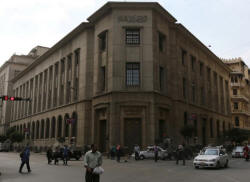|
Egypt's interest rate
hike to curb growth but not inflation, critics say
 Send a link to a friend
Send a link to a friend
 [May 22, 2017]
By Asma Alsharif [May 22, 2017]
By Asma Alsharif
CAIRO
(Reuters) - Egypt's financial community says Sunday's two-percent
interest rate hike, in line with calls from the International Monetary
Fund (IMF), will do little to curb rampant inflation and will harm
investment at a time when the country needs it most.
The central bank's first hike since a 3-percent rate rise in November is
aimed at dealing with inflation - now above 30 percent - as well as
demand-side pressures, after the IMF said action on those two factors
was vital to keeping Egypt's economic reform program on track.
But economists, businessmen and bankers say that inflation in Egypt,
where only 10 percent of the population have bank accounts, is due to
rising raw materials costs and a hike in rates will not produce the
desired effect.
The business community blames IMF pressure for what it says is a wrong
decision and says that Egypt's specific business and monetary
environment has not been taken into account and requires a different
approach.
"It is clear that the IMF is going by the book while Egypt is different
to other countries...so what works elsewhere does not necessarily work
here. There are different dynamics, such as that less than 10 percent of
the population is banked," a Cairo-based banker, who declined to be
named, said.

Thirteen of 14 respondents polled by Reuters had expected the central
bank to keep interest rates on hold.
"We don't understand the logic of this decision," Prime Holding
economist, Eman Negm, said, noting that the rate hike may have the
opposite effect of worsening inflation levels by raising borrowing costs
for companies.
[to top of second column] |

People walk in front of the Central Bank of Egypt's headquarters at
downtown Cairo, Egypt, November 3, 2016. Picture taken Egypt,
November 3, 2016. REUTERS/Mohamed Abd El Ghany

"The
central bank said they are targeting inflation but that is wrong because
inflation here is cost-push inflation. They are clearly influenced by the IMF
pressures," she said.
Egypt, which has been struggling to revive growth since an uprising six years
ago, floated its currency, as well as raising rates, in November. The pound has
halved in value since then.
Those moves helped it clinch a 3-year $12 billion IMF loan program tied to
ambitious reforms such as tax hikes and subsidy cuts which saw inflation jump to
a three-decade high at 31.5 percent in April.
"I don't understand how they can take such a step, how do they comply with all
the IMF's demands? The economy can halt," Cairo Chamber of Commerce board member
Alaa El-Saba said, referring to Sunday's rate hike.
"Borrowing now will cost me (interest of) more than 18 percent. This is a
ridiculous figure which will be added to the price of goods," he said.
Egypt's stock market fell 2.5 percent by 11:55 GMT. <.EGX30>
(Additional reporting by Ehab Farouk; Editing by Louise Ireland)
[© 2017 Thomson Reuters. All rights
reserved.] Copyright 2017 Reuters. All rights reserved. This material may not be published,
broadcast, rewritten or redistributed. |